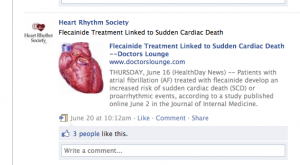July 18th, 2011 by John Mandrola, M.D. in Opinion, Research
1 Comment »

What should I have told the doctor who recently asked me about dronedarone (Multaq)?
“Supposedly, it’s [Multaq] just like Amiodarone, but without the side effects?” he asked.
Gosh…Should I, or shouldn’t I?
I took a big cleansing breath, reminding myself to stay civil, as at least Sanofi-Aventis, the makers of Multaq, sponsor a cycling team. Then I gave him my long answer:
I started with the fact that Multaq barely made it through the approval process. One of the original studies with Multaq (ANDROMEDA), a randomized trial of Multaq in patients with severe heart failure, showed that patients who took the drug were twice as likely to die.
Multaq eventually won approval for use in patients without significant heart failure and mild forms of AF, based on the results of the ATHENA trial—which randomized 4628 patients with non-permanent AF to either standard therapy or standard therapy plus Multaq. The ATHENA investigators didn’t exactly say that Multaq works, rather they claimed that it reduced a composite of hospitalizations and death.
This started the marketing machine in motion, the likes of which I have not ever witnessed. Read more »
*This blog post was originally published at Dr John M*
July 10th, 2011 by John Mandrola, M.D. in True Stories
No Comments »

The staff was concerned that she came to the office without her interpreter.
How would we communicate? How would I assess her symptoms?
“Should we get a translator from the hospital?” they asked.
I knew this patient well. I had done battle with rogue circuits in her left atrium more than once. I could even remember the fractions of the fractionated potentials–the squiggles of the squiggly line. I could recall my body’s joyous sensations when burning that precarious ridge of heart muscle steadied her heart’s rhythm.
“Got it,” we say.
Or Read more »
*This blog post was originally published at Dr John M*
July 6th, 2011 by John Mandrola, M.D. in News, Research
No Comments »

I have said that the best tool for treating atrial fibrillation (AF) is education. I still strongly believe this, perhaps more then ever.
AF presents itself to people in so many different ways–from no symptoms to incapacitation. Likewise, the treatments for AF range from simple reassurance and lifestyle changes, to taking a medicine, and on to having a complex ablation[s].
Because knowledge is so important to patients with AF, I encourage them to do outside research. This surely means going on-line. The problem, of course, comes with assessing the quality of information. It reminds me of what an old professor used to profess, “no data is better than bad data.”
What’s more, the vast diversity of AF makes comparing notes with friends problematic. One person’s wonder drug may be another’s poison.
Last week, this provocative AF headline came through on one of my Google Alert emails: 
“Flecainide Treatment Linked to Sudden Cardiac Death.” Read more »
*This blog post was originally published at Dr John M*
July 3rd, 2011 by John Mandrola, M.D. in Health Tips
No Comments »

The Biology of Omega-3 fatty acids: (Just a little science:)
When fish, flax-seeds or Brussels sprouts pass through the intestine, pancreatic enzymes transform the fat to free fatty acids. These acids are quickly taken up by the cells. Once in the cell, these fatty acids enter the mitochondria, endoplasmic reticulum and cytosol–places that you might recall because your mom helped you make a Cell sponge cake in 7th grade Biology.
In the cells, the Omega-3 fatty acids (ALA, DHA and EPA) exert their healthy influence in three major ways:
- in the control of chemical messengers;
- in the flux of ions—cell electricity;
- in the smoothness and health of the cell membrane.
That’s enough about cells.
How do these (good) fats help our bodies?
Omega-3 fatty acids reduce Inflammation:
–Omega-3s get in the cellular (not phone) mix and end up competing with chemicals that cause inflammation—medical people say they antagonize bioactive mediators of inflammation.
–Newly-discovered by-products of Omega-3s are important in the resolution phase of inflammation. Biochem people call these chemicals, resolvins. All you have to remember here is this: to resolve (inflammation) is heart-healthy.
–When omega-3s are incorporated into the membranes of cells they do a lot of good: things like making the membrane more fluid and less sticky. For some reason, they even block genes that induce hardening of the arteries. (Genomic effects.)
Omega-3s benefit the heart: They… Read more »
*This blog post was originally published at Dr John M*
June 24th, 2011 by John Mandrola, M.D. in Health Tips, Opinion
No Comments »

Not every Friday brings doctoring bliss. Sorry.
Some Fridays, the wrongness of our healthcare approach squeezes you like a vice-grip.
The medical news of the week can hit you hard.
–This highly tweeted report on how Overweight is the new normal speaks to the futility of asking people to help themselves. That our strong, vibrant, and proud citizenry is succumbing to fatness saddens me deeply. Building wider doors, heavier toilets and restaurant seats without armrests is the wrong approach to fighting obesity.
–We also learned this week that the advancing fury of medical therapeutics cannot counter high rates of obesity, smoking and inactivity. The WSJ health blog reports life expectancy in some Southern US counties trails that of El Salvador and Latvia.
–The nation’s chief doctor prescribes prevention over treatment, and no one retweets her. Silence.
–And the final egg on the face of wellness was this warning from the FDA: Read more »
*This blog post was originally published at Dr John M*













